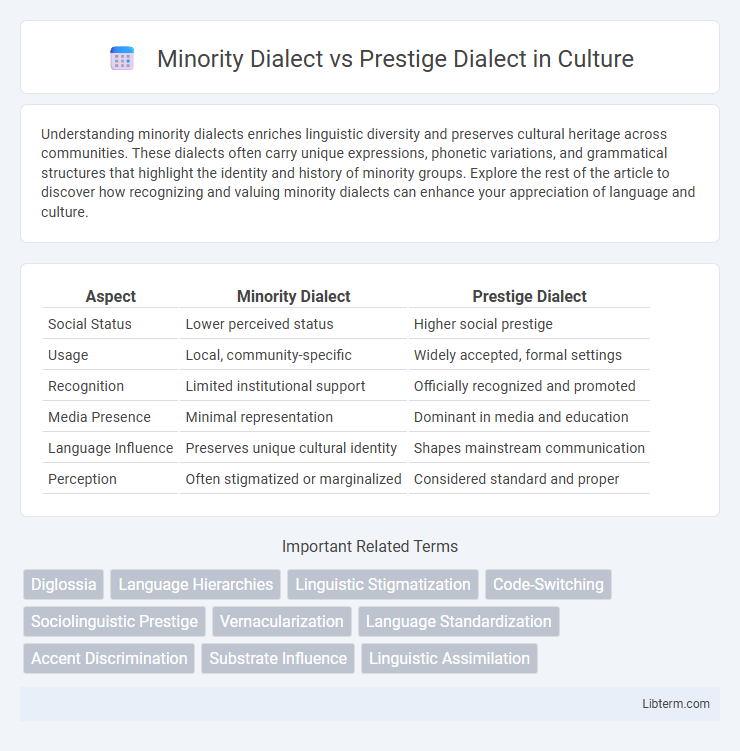Understanding minority dialects enriches linguistic diversity and preserves cultural heritage across communities. These dialects often carry unique expressions, phonetic variations, and grammatical structures that highlight the identity and history of minority groups. Explore the rest of the article to discover how recognizing and valuing minority dialects can enhance your appreciation of language and culture.
Table of Comparison
| Aspect | Minority Dialect | Prestige Dialect |
|---|---|---|
| Social Status | Lower perceived status | Higher social prestige |
| Usage | Local, community-specific | Widely accepted, formal settings |
| Recognition | Limited institutional support | Officially recognized and promoted |
| Media Presence | Minimal representation | Dominant in media and education |
| Language Influence | Preserves unique cultural identity | Shapes mainstream communication |
| Perception | Often stigmatized or marginalized | Considered standard and proper |
Introduction to Dialect Hierarchies
Dialect hierarchies reflect sociolinguistic structures where prestige dialects often dominate minority dialects through perceived social status and institutional power. Minority dialects typically possess unique phonological, lexical, and syntactic features that mark identity but face marginalization in formal settings. Understanding these hierarchies reveals how language variation ties to social inequality and cultural preservation.
Defining Minority Dialect
Minority dialect refers to a language variety spoken by a smaller, often marginalized segment of a population, typically differing from the dominant or majority language used in education, media, and government. These dialects carry distinct phonological, lexical, and syntactic features that reflect the social identity and cultural heritage of their speakers. Minority dialects frequently face challenges such as limited institutional support and negative social attitudes, which impact their preservation and intergenerational transmission.
Understanding Prestige Dialect
Prestige dialects are language varieties associated with social power, higher education, and economic advantage, often spoken by influential or affluent groups within a society. These dialects serve as linguistic benchmarks for correctness, shaping educational standards and media representation. Mastery of the prestige dialect can enhance social mobility and access to institutional resources by aligning speakers with dominant cultural norms.
Historical Context of Dialect Prestige
The historical context of dialect prestige reveals how social, political, and economic power shapes linguistic hierarchies, with prestige dialects often emerging from dominant cultural centers or ruling classes. Minority dialects frequently face stigmatization as they are associated with marginalized groups or regions lacking political influence. This dynamic reinforces social inequalities, as prestige dialects become markers of education, authority, and elite status, while minority dialects struggle for recognition and legitimacy.
Social Implications of Dialect Differences
Minority dialects often face social stigmatization, leading to reduced educational and employment opportunities for their speakers. Prestige dialects are perceived as standard or superior, granting social advantages and greater access to power structures. This linguistic hierarchy reinforces social inequality and can contribute to cultural marginalization.
Educational Impact of Prestige and Minority Dialects
Prestige dialects often dominate educational settings, influencing curriculum design and teacher attitudes, which can marginalize students who speak minority dialects and hinder their academic performance. Minority dialect speakers may face challenges such as reduced access to resources and social stigma, impacting literacy development and academic self-esteem. Incorporating culturally responsive teaching that validates minority dialects promotes inclusivity and improves educational outcomes for diverse linguistic backgrounds.
Language Attitudes and Stereotypes
Minority dialects often face negative language attitudes and stereotypes, perceived as less prestigious or incorrect compared to prestige dialects commonly associated with social power and education. Speakers of minority dialects may experience linguistic discrimination and social marginalization, reinforcing societal hierarchies tied to language use. Prestige dialects carry connotations of intelligence, competence, and authority, influencing opportunities in education, employment, and social mobility.
Dialect Discrimination and Social Mobility
Dialect discrimination limits social mobility by stigmatizing minority dialect speakers, often resulting in unequal access to education, employment, and social resources. Prestige dialects, associated with higher social status and cultural capital, facilitate upward mobility by aligning speakers with dominant institutional norms. Addressing dialect bias is essential for promoting linguistic diversity and ensuring equitable opportunities in socioeconomic advancement.
Preservation of Minority Dialects
Preservation of minority dialects is crucial for maintaining linguistic diversity and cultural heritage, as these dialects embody unique historical narratives and community identities. Efforts to document and revitalize minority dialects involve educational programs, digital archiving, and community engagement to counter the dominance of prestige dialects often associated with social power and media influence. Supporting minority dialects fosters inclusivity and resilience in language ecosystems, preventing language shift and loss in increasingly globalized societies.
Future of Dialect Diversity and Equity
The future of dialect diversity and equity hinges on recognizing and valuing minority dialects alongside prestige dialects in education, media, and policy. Promoting inclusive linguistic practices can reduce social stigma, foster cultural preservation, and enhance equal opportunities for speakers of diverse dialects. Technological advancements in AI-driven language tools offer promising support for dialectal representation and accessibility, reinforcing linguistic equity.
Minority Dialect Infographic

 libterm.com
libterm.com